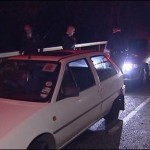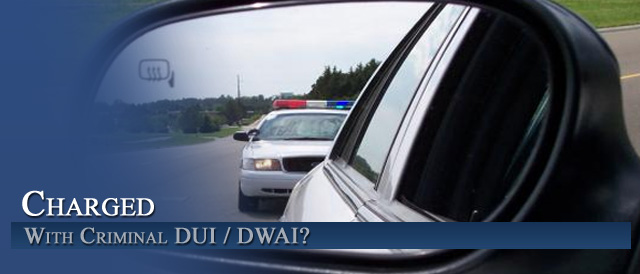
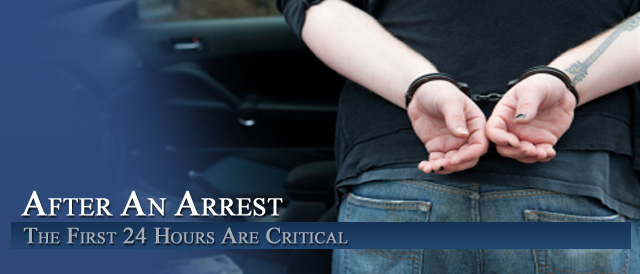

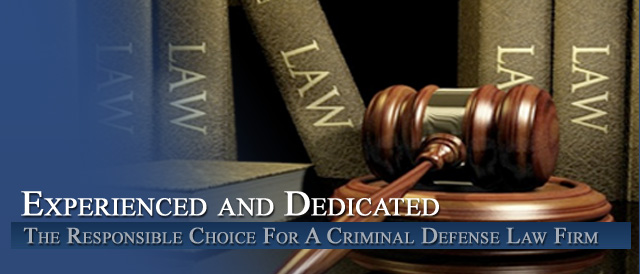
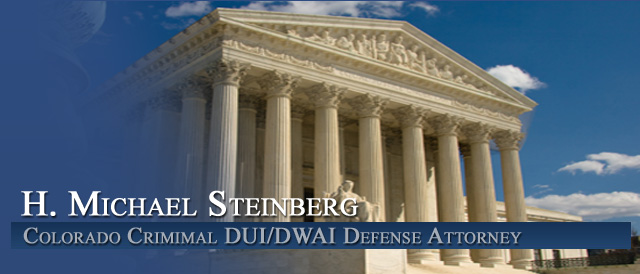
The Meaning Of “Driving” Under Colorado DUI Law
By Colorado DUI Defense Lawyer – Attorney – H. Michael Steinberg
The Meaning Of “Driving” Under Colorado DUI Law is complex – and quite surprising as it defies common sense – is overly broad in scope and catches the unwary..
Acting Responsibly And Still Getting Charged With DUI In Colorado – Sleeping It Off In Your Car
To prove a DUI -DWAI -DUID in Colorado – the state of Colorado has to prove you were driving. It is the one common element ti all alcohol-related traffic charges. Even if you choose – on a cold Colorado night – to do the right thing and to pull over to sleep it off. – you can and will still be charged with DUI – if the keys are in the ignition and the car engine is OFF..
If the police actually observe you driving it is not a significant issue. But that occurs in only some of the cases. Colorado has greatly expanded the definition of “driving” much beyond the classic “weaving” based traffic stop.
You won’t find a legal definition of “driving” in any specific Colorado DUI law. However while “driver” is defined by the law – driving is not.
“Driver” means “every person . . . who drives or is in actual physical control of a vehicle.” C.R.S. � 42-1-102(27).
What then is “actual physical control”? Well you have to look at the specific cases that have been decided by the courts of Colorado to understand what the phrase means – and here is where what should be simple – becomes complex.
To understand the meaning of “driving” you might start with the Colorado Supreme Court opinion in the “Swain” case:
In Swain ..deputies approached a pick-up truck parked from one to three feet off the road in the grass. Loud music coming from the truck and Swain was lying, either asleep or passed out, in the front seat, with his head resting toward the passenger’s side door. The keys were in the ignition but the engine was not running. In this case “actual physical control” was defined by the judge at trial as:
“Actual Physical Control” is present when a person exercises bodily influence or direction over a motor vehicle; which is to be decided by a totality of the circumstances.
Factors you may consider in deciding whether or not a person was in actual physical control of a motor vehicle, include, but are not limited to the following:
A. Where the vehicle was found;
B. Where in the vehicle the person was found;
C. Whether or not the keys were in the motor vehicle’s ignition;
D. Whether or not the motor vehicle was running;
E. Any other factor which tends to indicate that the person exercised bodily influence or direction over a motor vehicle or not based on your every day experience.
* No one factor listed above definitively decides whether or not a person was in actual physical control of a motor vehicle.
Even though you would expect the state to have to prove “some movement of the vehicle.” The Colorado Supreme Court, said no – the definition above was sufficient and no movement was necessary. In Colorado then – the DUI statute does not require any movement of the vehicle.
The Meaning Of “Driving” Under Colorado DUI Law – “The Totality Of The Circumstances”
Driving is a question for the jury and that the jurors should consider the totality of the circumstances. Furthermore the list of circumstances where driving may be inferred is not limited by the examples above – the catch-all “any other factor” language means the definition is dependent on how the jury interprets the case facts.
Here are some other examples of “driving” cases in Colorado:
Passed Out In The Parking Lot Of A Bar – Keys In The Ignition – Passed Out Engine On OR OFF
Caple v. Department of Revenue, 804 P.2d 873 (Colo. App. 1990) – defendant “driving” for DMV purposes when found alone behind the wheel of his car, in the parking lot of a bar, either passed out or asleep, with his seat belt on, the keys in the ignition turned to the on position but the engine off, with the dash lights and radio on.
Motor Vehicle Division v. Warman, 763 P.2d 558 (Colo. 1988) – defendant who is asleep or unconscious behind the wheel of a car with its motor running and parking lights on in the parking lot of a convenience store is operating a motor vehicle for the purposes of the expressed consent law.
Stuck In A Snow Bank – Seated Behind The Wheel
Colorado Division of Revenue v. Lounsbury, 743 P.2d 23 (Colo. 1987) – actual physical control was established by evidence that defendant was seated behind the wheel of a motor vehicle; the car’s engine was running and the car was being pulled out of a snowbank by a Jeep.
Smith v. Charnes, 728 P.2d 1287 (Colo. 1986) – defendant asleep or unconscious behind the wheel of a stopped vehicle, with engine running and lights on establishes actual physical control.
Brewer v. Motor Vehicle Division, 720 P.2d 564 (Colo. 1986) – defendant found asleep behind the wheel of his car, with the motor running and the lights on, in a cul-de-sac was in control for DMV purposes.
The Meaning Of “Driving” Under Colorado DUI Law – Public Road Or Private Driveway Does Not Matter For “Driving” Purposes
Under Colorado law – it does not legally “matter” whether the evidence shows you were contacted on a public road or highway, on a private road, or even on private property. The Colorado Supreme Court has held any person who drives a motor vehicle anywhere in the state, including in a private parking lot can be charged with DUI.
The Meaning Of “Driving” Under Colorado DUI Law – Inoperable Car? – Broken Down Vehicles
The law in Colorado also requires that a vehicle must be operable or “reasonably capable of being rendered operable” in order for a defendant to be convicted of an alcohol-related offense.
But beware – even here there are traps… a flat tire, a dead battery, running out of gas and other disabling situations are not enough to prevent an attempt to prosecute you for DUI in Colorado/
If a a vehicle “is reasonably capable of being rendered operable” as opposed to being “totally inoperable” – that is – when a temporary condition can readily be fixed you can still be prosecuted for DUI.
The Meaning Of “Driving” Under Colorado DUI Law – Denver Colorado DUI – DWAI – DUID – Criminal Defense Lawyer
The Law Offices of H. Michael Steinberg, in Denver, Colorado, provides criminal defense clients with effective, efficient, intelligent and strong legal advocacy. We can educate you and help you navigate the stressful and complex legal process related to your criminal defense issue.
H. Michael Steinberg, is a Denver, Colorado criminal defense lawyer who will provide you with a free initial case consultation to evaluate your legal issues and answer your questions with an honest assessment of your options.
Helping Clients To Make Informed Decisions On Colorado DUI – DWAI -DUID Issues – Criminal Defense Lawyer H. Michael Steinberg provides solid criminal defenses for clients throughout the Front Range of Colorado on The Meaning Of “Driving” Under Colorado DUI Law.
Other Articles of Interest:
- After The DUI -DWAI – DUID – Colorado Alcohol Based Driving Convictions For Driving Under Revocation, Denial And Restraint 42-2-138
- Expungement – Sealing DUI Charges In Colorado – Traffic Charges Such As DUI – DWAI’s Can Never Be Sealed or Expunged
- Attorney Profile
- What Are Colorado’s Open Container Laws – Who Can Be Charged? – Alcohol – Marijuana
- Proving Driving Under Revocation § 42-2-138 – In The State Of Colorado




